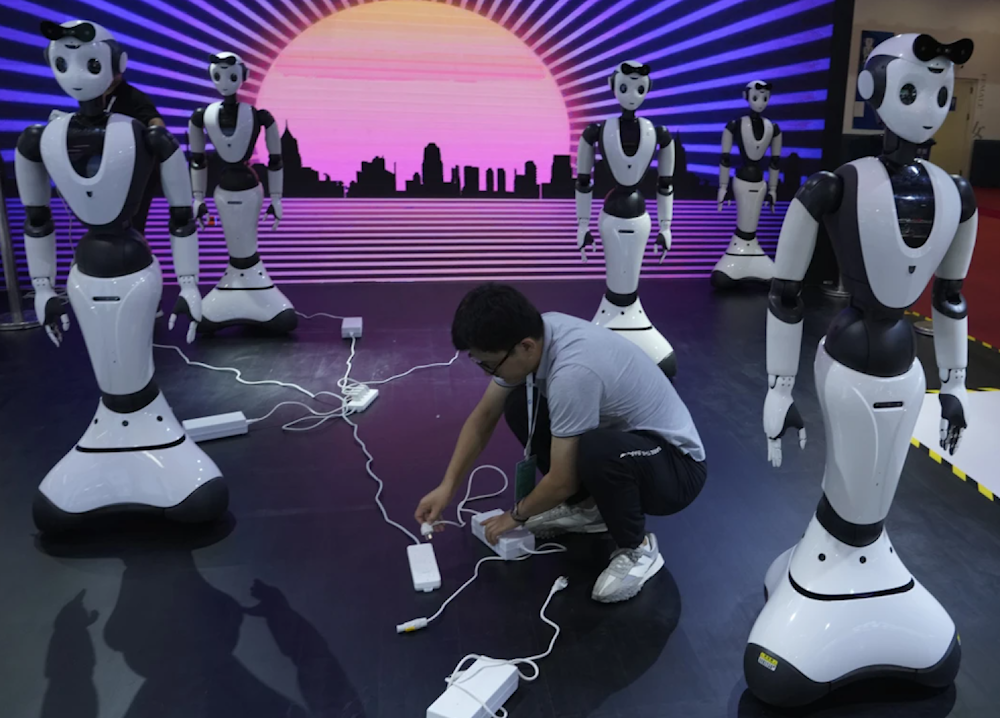China aims to surpass US in $4.8 trillion AI market race
Beijing’s current strategy echoes its earlier Digital Silk Road effort, where it advanced its tech presence across continents via telecommunications infrastructure.
-

A worker charges robots displayed at the annual World Robot Conference at the Beijing Etrong International Exhibition and Convention Center in Beijing on August 16, 2023 (AP)
China has unveiled plans for a new international body, the World AI Cooperation Organization, aimed at promoting safe and inclusive use of AI. Premier Li Qiang used the forum to warn against monopolization of AI by a few dominant players, urging cooperation, particularly from developing nations, on global governance standards.
The initiative reflects China's broader strategy to rival US leadership in AI by presenting itself as an advocate for equitable access and regulation. Favorable international rules could help Chinese firms expand in the global AI market, expected to reach $4.8 trillion by 2033, especially in regions where they already offer competitive alternatives to US tech.
Analysts note that China’s AI solutions are often more practical for low-income nations with limited computing power, a stark contrast to resource-heavy systems like those from OpenAI. As Eric Olander from the China-Global South Project put it, China's AI offerings are “extremely appealing” to these countries.
Beijing’s current strategy echoes its earlier Digital Silk Road effort, where it advanced its tech presence across continents via telecommunications infrastructure. Similar to Huawei’s previous attempts to influence global standards in 5G, China now seeks to shape the AI landscape and position its companies at the center of it.
Trump vows 'whatever it takes' to lead
Last week, US President Donald Trump declared that the US would “do whatever it takes” to lead in artificial intelligence, outlining a strategy that includes pushing back against Chinese influence in global AI governance.
Currently, there are no binding international rules for AI development. In contrast, China’s approach emphasizes building clean-powered digital infrastructure and standardizing computing capabilities. Its action plan also supports allowing businesses to shape technical standards in areas like security, industry, and ethics.
China’s proposed international AI body, the World AI Cooperation Organization, to be based in Shanghai, remains vague in structure. In brief remarks before the media were dismissed, Chinese Vice Foreign Minister Ma Zhaoxu said the organization aims to develop global standards and governance frameworks and that China would engage with countries open to joining the initiative.
China's appeal of openness
Beijing’s AI strategy draws heavily from its broader diplomatic playbook, which promotes elevating Global South countries in international decision-making. In his opening remarks at Saturday’s event, Premier Li Qiang highlighted China’s commitment to helping these nations develop their AI capabilities.
The majority of the more than 30 countries invited to the high-level governance talks were from the Global South, including Ethiopia, Cuba, Bangladesh, Russia, and Pakistan. A few European nations, such as the Netherlands, France, and Germany, along with the EU and several international organizations, also participated.
Notably absent was any visible US delegation, as Bloomberg News reported that there was no nameplate for the United States at the event.
Beijing’s push for “openness”, a term repeated 15 times in its AI governance action plan, appears to be reinforced by the global attention garnered by Chinese startup Deepseek earlier this year. The company impressed observers not only by releasing AI models nearly on par with OpenAI's, but by making them freely downloadable and customizable.
Following Deepseek’s lead, a wave of Chinese companies, from tech giants like Alibaba to newcomers like Moonshot, have released advanced large language models with open-weight access.
China’s Global AI Governance Initiative, released in 2023, emphasizes the importance of respecting national sovereignty and complying with local laws when offering AI products and services to other countries.
By contrast, President Trump’s AI strategy asserts that the US government will collaborate only with engineers who “ensure that their systems are objective and free from top-down ideological bias.”

 4 Min Read
4 Min Read










